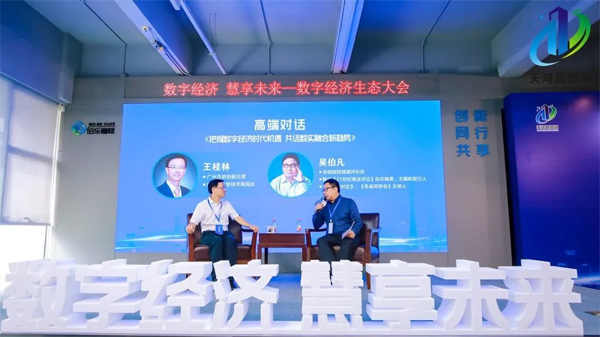Tianhe hosts digital economy conference
The Digital Economy Ecology Conference, which was jointly hosted by the Tianhe Science Park Information Industry Association and Hongtai Wisdom Valley, recently took place in Guangzhou's Tianhe district.
More than 100 experts and enterprise representatives attended the conference, discussing Guangzhou's practices in sci-tech innovation and how to seize the development opportunities of the digital economy.
Zhan Yanzun, secretary of the Party committee of the Tianhe Science Park, said that Tianhe Intelligence Business District, which is built on the basis of the science park, has been using digital technologies to promote innovation and increasing openness to digital application scenarios, deepening the integrated development of digital technologies with the real economy.

A talk between Wang Guilin and Wu Bofan. [Photo/WeChat account: tianhefabu]
The "1+N" modern industrial system, which has the next-generation information technology as the mainstay and is supported by artificial intelligence and digital creativity, has been developed in Tianhe Intelligence Business District, gathering over 2,000 tech enterprises and generating a gross revenue of 284.9 billion yuan ($42.3 billion) in 2021.
According to Wang Guilin, head of the Guangzhou municipal bureau of science and technology, boosting sci-tech innovation requires finding the key points and then concentrating superior resources to them to form a differentiated competitive advantage.
The scholar Wu Bofan shared that the total digitalization of the economy is the creation of a new world based on digital technologies, where hyper-connectivity and convergence among devices, technologies, as well as industries will be the norm. He noted that how firms and enterprise platforms evolve into the most adaptive and competitive economic agents is a key factor for development.
Enterprises should pay attention to improving their digitalized "hard" culture like digital overall portrait and VI systems, as well as its "soft" culture like employee's digital group consciousness and abilities, added Wu.
